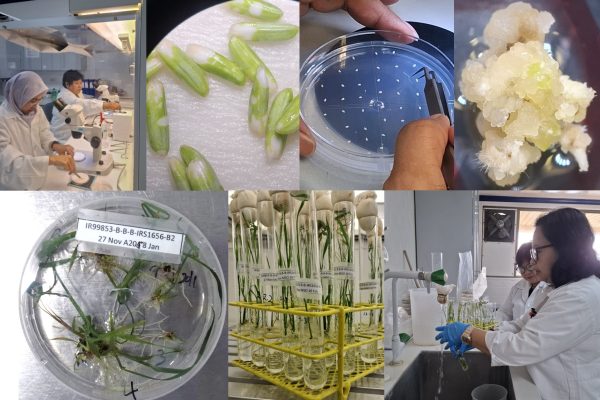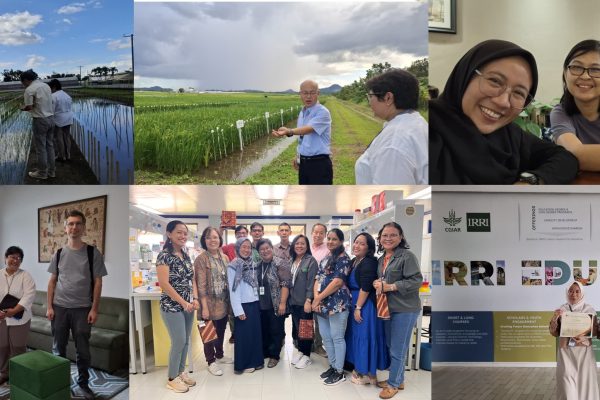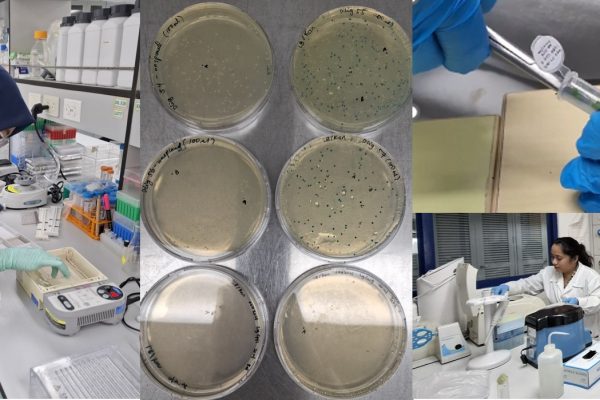Starting from Monday, January 27, until Friday, February 21, 2025, a faculty member from the Faculty of Biology UGM, Prof. Dr. Yekti Asih Purwestri, had the opportunity to participate in the training program “Gene Editing for Indica Rice and Excellence Through Stewardship” at the International Rice Research Institute (IRRI) in Los Baños, the Philippines. This program is a significant milestone of the KONEKSI partnership program between Australia and Indonesia, titled “Building a Sustainable Future: Developing Nutritious and Climate-Resilient Crop Varieties” in collaboration with IRRI Philippines and BRIN Indonesia. Aimed at enhancing capacity building, this funding also provided an opportunity for a young lecturer, Dr. Siti Nurbaiti, to take part in the program, as she is also conducting research on rice.
During the four-week training at IRRI, all activities were supervised by Dr. Inez Slamet-Loedin, an Indonesian diaspora who also serves as Principal Scientist and Head of the Genetic Design and Validation Unit at IRRI, Philippines. Before actively engaging in laboratory activities, Prof. Yekti and Dr. Baiti had to complete an online course on Good and Safe Laboratory Practices, studied about Stewardship, Biosafety, and Regulations regarding plant products derived from the use of Plant Breeding Innovations (PBIs) in the Philippines. In general, these genome editing activities in the Rice Breeding Innovation unit involved two laboratories: Gene Editing and Transformation Lab (GETL) led by Dr. Inez Slamet-Loedin, and Gene Identification and Validation Lab (GIV) led by Dr. Sung Ryul Kim.
The introduction to Genome Editing (GEd), Escherichia coli plasmid vector design and guide RNA construction, oligonucleotide duplex synthesis, ligation, Agrobacterium transformation, confirmation and validation, and glycerol stock preparation were conducted in the GIV Lab. The developed constructs were then transferred to the GETL Lab, where they were introduced into plants through Agrobacterium-mediated transformation of immature embryos via tissue culture. The resulting plants were grown in regulated greenhouse and screenhouse facilities, followed by mutation screening using molecular genotyping analysis from DNA and phenotyping analysis based on growth and development parameters such as tillering capacity, leaf number, leaf greenness, and stress responses. Additionally, Prof. Yekti and Dr. Baiti also studied seed processing, covering harvesting, storage techniques, and maintaining seed viability for both daily use and long-term preservation. Some GEd projects conducted include the development of rice varieties with enhanced Nitrogen Use Efficiency (NUE) and the improvement of Zinc (Zn) and Iron (Fe) content in rice.
In addition to laboratory activities, Prof. Yekti and Dr. Baiti had the opportunity to visit the IRRI Genebank, which houses a vast collection of cultivated rice varieties from various countries, including wild rice species. They also explored the Speed Breeding Facilities, which enable studies on rice growth and development under various controlled environmental conditions. Meetings and discussions with experts from various fields were also conducted, including Dr. R. Mauleon and Dr. Dmytro Chebotarov, experts in bioinformatics, who introduced the SNP-Seek platform, which was developed by IRRI (https://snp-seek.irri.org/); Dr. Amelia Henry, an expert in root system research; and Rice breeders from Korea. The program concluded with a final presentation summarizing all the knowledge and experiences gained, held on Friday, February 21, 2025. During the training, Dr. Baiti also had the opportunity to meet with a collaborator from the University of the Philippines Los Baños (UPLB), Assoc. Prof. Dr. Alona C. Linatoc, who has been actively involved in the Summer Course program organized by the Faculty of Biology UGM.
This program also supports the Sustainable Development Goals (SDGs), including SDG 4: Quality Education, SDG 12: Responsible Consumption and Production, and SDG 17: Partnerships for the Goals. Looking ahead, it is hoped that more collaborations and opportunities will be created to continuously enhance the capacity of faculty members at the Faculty of Biology, UGM, further contributing to the advancement of education in Indonesia.



